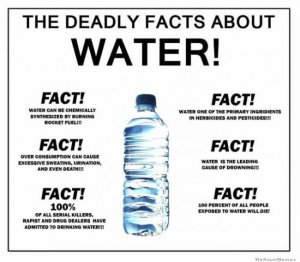For decades, we’ve known that sex sells. From the iconic and oh-so-sexy Cindy Crawford Pepsi commercials of the ’90s to the Kardashians of today, supermodels, sex, and beauty have played a huge role in sales.
But what if I told you that “fear” is the new “sex” when it comes to selling something? Marketers everywhere know this and take advantage of the average consumer’s general lack of knowledge or trust in the sciences, food, and medicine to profit.
And it’s time we are all aware of it.
Here is just one good example:
This just in: All coffee contains a dangerous chemical pesticide called 1,3,7-trimethylxanthine. This compound has been known to disrupt the action of the hormone adenosine in the human central nervous system. In addition to being highly lethal to insects, it has been shown to be highly addictive to humans and other mammals. It is linked to insomnia, dehydration, heart disease, cancer, and DEATH.
The chemical pesticide that I’m talking about is caffeine, the drug that we all know and love and that most of us probably consume every day. This is just an example of how any chemical can be made to sound absolutely terrifying. Because we’re all sane humans, we know that large doses of caffeine are dangerous, but small doses (like the amount in a cup of coffee) are perfectly safe for just about everyone. We also know that we should avoid caffeine if we have hypertension, heart disease, are nursing/pregnant, etc.
Everything sucks and is terrifying! Unless you think critically about it, in which case it totally rocks and isn’t scary at all.
This type of fearmongering can be applied to all different places in our lives. GMOs, chemicals, ingredients, heck … even water can be made to sound awful.

And GMOs? Ever do a Google image search for “GMO?” Often times we see scary syringes, mad-scientist-type propaganda imagery, or crops that never had GMO counterparts to begin with. Trace the images back and they oftentimes come from a place funded by organic and non-GMO food companies or activists because it sells!
Jimmy Kimmel did this famous video, “What is a GMO?” In this humorous sketch, they realize that many of people against GMOs don’t really know what they are. Some are led to believe that organic and non-GMO foods are not modified, but this couldn’t be further from the truth. Everything we eat has been modified in some way; none of our food is natural.
But “natural” sounds good, doesn’t it? Scientifically speaking, “natural” means nothing in terms of toxicity or safety. But “nature” can also be made to sound peaceful and kind. So, why create fearmongering campaigns around stuff that is not natural? Easy: profit.
Professor of plant genetics, biotechnology, and genomics from Tuskegee University, Dr. C.S. Prakash, had this to say about the recent article in Scientific American titled, “Are you scared of GMO foods?“
“Instead of trying to convince people that GMOs are not bad for them, teach them about basic science. Science is amazing, awe inspiring, challenging and exciting. We scientists need to focus more on teaching people what we know.” — Prakash
I couldn’t agree more. Without the knowledge of basic science that affects our lives daily, it is very easy to scare into persuasion, “X product is toxic! Buy OUR product!”
Paracelsus was a 16th century Swiss German physician, alchemist, and astrologer who found the discipline of toxicology. He came up with this basic principle of toxicology: The dose makes the poison.
“All things are poisons, for there is nothing without poisonous qualities. It is only the dose which makes a thing poison,” he said
Caffeine, water, wine, aspirin, and so much more all have the ability to cause major problems if we consume too much. Consume just a little bit and we can feel the benefits.
These are just a couple of examples, but the next time you hear of something scary, let’s put on our critical thinking caps to raise a skeptical eyebrow when something sounds too hyperbolic to be true. #ScientistsArePeople is a great hashtag to check out to fact check and connect with real world scientists who truly excel in their fields.
Michelle Miller, the Farm Babe, is an Iowa-based farmer, public speaker, and writer, who lives and works with her boyfriend on their farm, which consists of row crops, beef cattle, and sheep. She believes education is key in bridging the gap between farmers and consumers.



